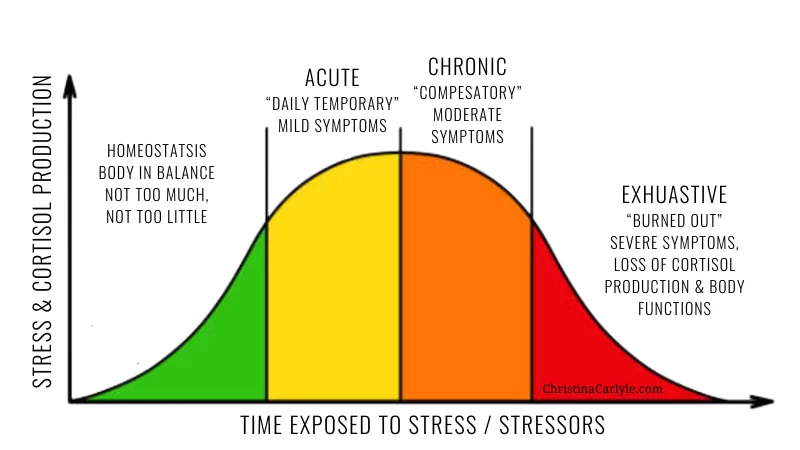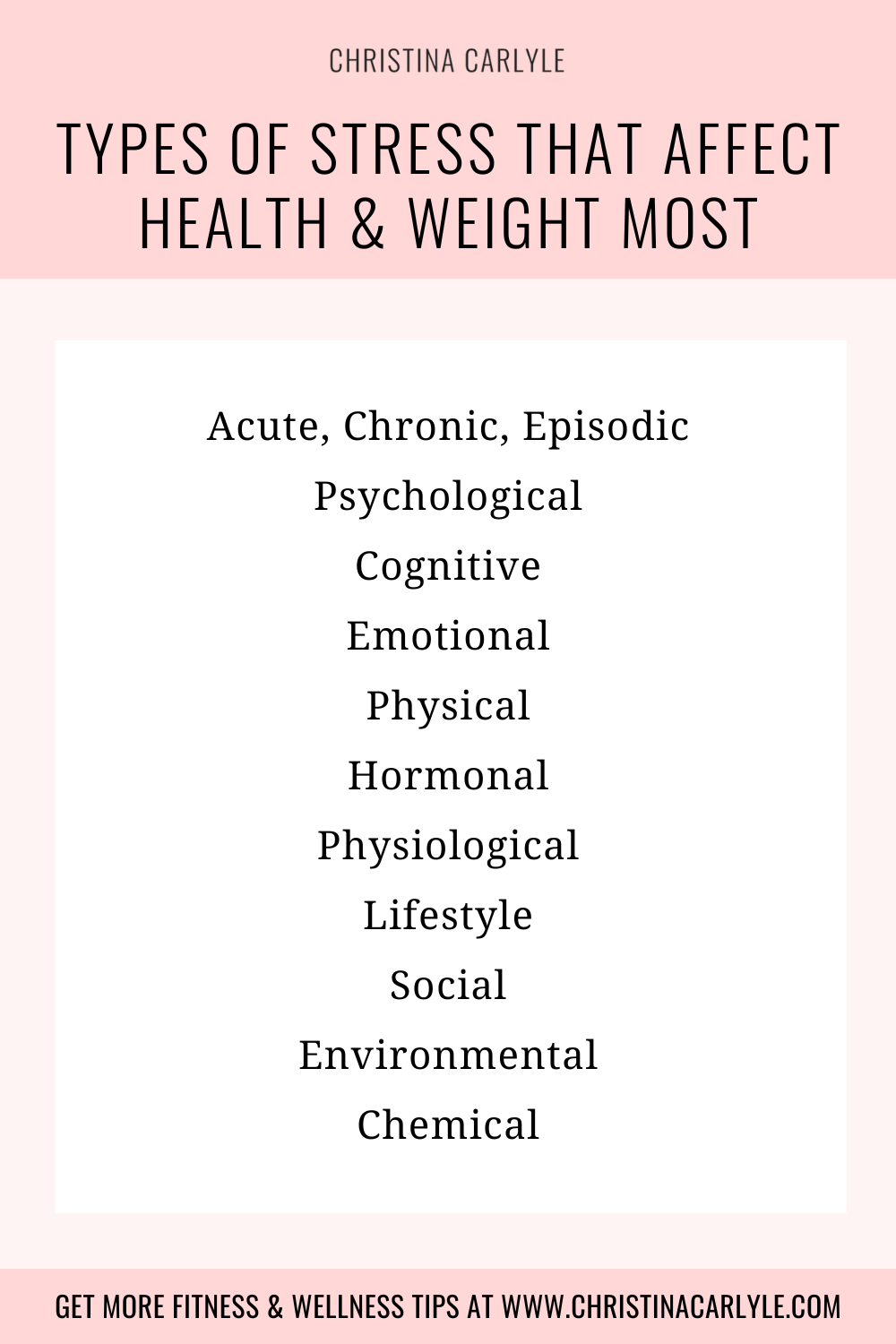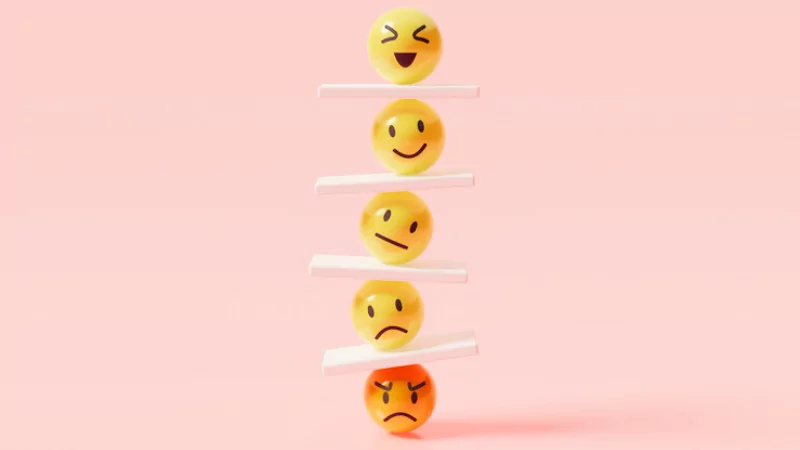Last Updated on December 7, 2023
Do you know the different types of stress? Hint: There are more than 50 kinds and some are a lot better for you than others.
Keep reading to discover the different types of stress that affect your health and weight the most… so you can avoid them and all the nasty issues they cause.
You probably already know that stress is horrible for you and that stress, weight loss/gain, and health issues are directly related. I discuss the damaging effects of cortisol on weight and health here.
Long story short, the more stress have the more health problems and weight you’ll gain.
But do you know all of the different types of stress that you should be avoiding?
When I discuss stress with my clients, most automatically assume I’m talking about mental or emotional stress.
But stress is far more complex than that. That’s why I’m doing a deep dive into the different kinds of stress.
Once you know what affects you most and how damaging stress is – it’s easier to get motivated to reduce unnecessary stress in your life.
Let’s dig in!
Different kinds of Stress
First things, first… Stress can be classified into different types based on its nature and sources.
Acute, chronic, and episodic stress are three categories that describe the duration of stress.
Others, like emotional, physical, and chemical stress describe the nature or sources of stress.
Acute, Chronic, and Episodic Stress
Acute, chronic, and episodic stress are the three distinct forms of stress that differ in their duration, causes, and effects on the body and mind. Some are more damaging than others.
Here’s a quick breakdown of each:
Acute Stress
- Duration: Acute stress is short-term and temporary, typically lasting for a brief period. It’s normal and safest compared to chronic and episodic. But can be problematic when different types of acute stress occur all day, every day.
- Causes: It is often triggered by specific events or situations, such as a deadline, an argument, a near-accident, or a challenging situation.
- Response: The body’s “fight or flight” response is activated, leading to a surge in stress hormones like adrenaline and cortisol.
- Symptoms: Symptoms of acute stress can include increased heart rate, heightened alertness, dilated pupils, and a burst of energy to cope with the immediate threat.
Chronic Stress
- Duration: Chronic stress is long-term and persists over an extended period, often for months or even years. This is the most dangerous type of stress in terms of symptoms and complications it causes.
- Causes: It is usually associated with ongoing, persistent stressors such as work pressures, financial difficulties, relationship problems, or chronic health issues. It’s also caused by overconsumption of stress-inducing consumables like toxic foods, drinks, and emotionally triggering upsetting content over an extended period.
- Response: The stress response becomes a constant state, leading to prolonged exposure to elevated levels of stress hormones. Over time, the body’s ability to produce cortisol can be affected leading to critically high or low levels. This is when symptoms escalate and self-treatment/self-medicating is common. ‘Stress/Emotional’ eating,
- Symptoms: Chronic stress can contribute to a range of physical and mental health problems, including fatigue, inflammation, headaches, digestive and gut health issues, anxiety, depression, weight gain/stubborn fat, nervous system issues, and an increased risk of cardiovascular disease, diabetes, and cancer.
Episodic Stress
- Duration: Episodic stress involves recurring episodes of acute stress, resulting in a more prolonged state of tension. Each episode may be relatively short-lived, but the pattern of frequent stressors persists over time. An example would be celebrating the holidays, preparing your taxes, daylight savings time, and transitioning kids back in to or out of school. This is normal and unavoidable stress. It impacts your health more than acute stress but not as bad as chronic because episodic stress is temporary.
- Causes: Individuals experiencing episodic stress often encounter a variety of stressors on a regular basis. These stressors may arise from different aspects of life, such as work, relationships, or personal responsibilities.
- Response: Similar to acute stress, the body’s “fight or flight” response is activated during each episode of stress. The individual may move from one stressor to another without much opportunity for the stress response to fully subside.
- Symptoms: Individuals with episodic stress may exhibit chronic worry, anxiety, irritability, and a tendency to be frequently on edge. The persistent state of tension can lead to physical symptoms such as headaches, muscle tension, and fatigue.
All types of stress have an impact on your health and metabolism. Acute stress that resolves quickly isn’t as detrimental to your health and metabolism as chronic, episodic stress. In fact, you need *some* stress to stay healthy.
Not all stress is bad
Some moderate to mild stress, referred to as eustress, is vital for overall well-being, fostering adaptability, resilience, and personal growth by encouraging the development of coping mechanisms and problem-solving skills.
This positive stress acts as a motivator, improving focus, productivity, and cognitive function. Without some stress, life would be pretty boring.
Some examples of ‘good’ stress include feeling anxious or nervous before a specific project or a date, trying to finish a deadline, multitasking, or riding a rollercoaster ride.
Short-term stressors also activate the immune system and contribute to physical fitness. Stress plays a role in building social bonds and support networks, providing opportunities for learning and connection with others.
But having too many stressors or stressors that are more intense can start to have an affect on the body. For example, getting the adrenaline rush from riding rides at a theme park is fine short term. But it wouldn’t be ideal to do it every day.
Maintaining a healthy balance is crucial, as chronic stress can have potentially devastating effects on your mind, health, and weight.
Effectively managing stress through healthy coping strategies, self-care, and a healthy lifestyle is imperative for optimal health. 
Too much of the different kinds of stress can contribute to negative health consequences, including cardiovascular problems, digestive issues, and mental health disorders like anxiety and depression.
The cumulative effect of frequent stressors can impair overall well-being. To reduce and prevent stress you must first identify the underlying causes of your recurring stressors, and then use stress management techniques.
SOURCES OF UNHEALTHY STRESS
Stress on the human body can come from various sources, and it can be both physical and psychological.
Here’s a list of some of the most common sources of stress that affect health, mood, energy and weight most:
Psychological Types of Stress:
- Work-related stress
- Financial stress
- Relationship problems
- Academic pressure
- Family conflicts
- Grief and loss
- Mental health issues (e.g., anxiety, depression)
- Trauma or past experiences
- Daily hassles and life events
Cognitive Types of Stress:
- Negative thought patterns
- Perfectionism
- Self-criticism
- Worry and rumination
- Decision-making and uncertainty
- Information overload
- Lack of self-acceptance
Emotional Types of Stress:
- Anger and frustration
- Anxiety and fear
- Sadness and grief
- Jealousy and envy
- Guilt and shame
- Resentment
- Coulda, Shoulda, Woulda mentality
Physical Types of Stress:
- Illness or injury
- Chronic health conditions (e.g., diabetes, heart disease)
- Sleep disturbances
- Poor nutrition or dietary imbalances
- Physical overexertion
- Environmental factors (e.g., extreme temperatures, pollution)
- Substance abuse (alcohol, drugs)
- Medication side effects
- Inadequate hydration
- Inadequate cell, organ, or system function (e.g. gut health issues, failing gallbladder, poor thryoid function, etc.)
Hormonal and Physiological Types of Stress:
- Hormonal imbalances
- Menstrual or menopausal changes
- Puberty-related stress
- Pregnancy and childbirth
- Aging-related changes
- Spikes in cortisol and adrenaline
- Nutrient deficiency or imbalance
Lifestyle Types of Stress:
- Unhealthy habits (smoking, excessive alcohol consumption)
- Poor time management
- Sedentary lifestyle
- Overwork and burnout
- Lack of social support
- Excessive screen time
- Lack of relaxation and leisure time
- Lack of purpose
- Lack of fun
Social Types of Stress:
- Peer pressure
- Social isolation
- Discrimination and prejudice
- Bullying and harassment
- Changing social dynamics and relationships
- Support System changes
- Loss of friendship(s)
- Being ostracized
Environmental Types of Stress:
- Light, noise, air, or sound pollution
- Crowded conditions, urban congestion, crowds, long lines, etc.
- Natural disasters
- Long commutes and traffic
- Job-related hazards (exposure to chemicals)
- Toxic environment (no support system, abuse, bullying, belittling, etc.)
- Mold and mildew
- Radon gas
- Lead paint
- Asbestos
- Volatile organic compounds (VOCs) from paints, carpets, and furnishings
Chemical Types of Stress:
- Air pollution – particulate matter, ozone, pollutants from vehicles and industry
- Water pollution – heavy metals, industrial chemicals, pesticides
- Soil contamination – pesticides, herbicides, industrial waste
- Exposure to toxic chemicals – workplace, household
- Exposure to Heavy metals – lead, mercury, cadmium, etc, from diet and poor quality supplements & protein powders
- Pharmaceuticals and Medications
- Supplements
- Personal Care Products – Cosmetics, hygiene, hair care, nail & skincare products, fragrances, self-tanners, etc.
- Food and Diet – Contaminated or processed foods, pesticides, herbicides, additives and preservatives
- Lifestyle Choices – Smoking and exposure to tobacco-related chemicals, Alcohol and drug abuse, Exposure to recreational drugs and their byproducts
- Allergens: Environmental allergens (pollen, pet dander) and Food allergens (peanuts, shellfish)
How many do you experience on a daily or weekly basis? Generally speaking, the more you have the worse your immunity & metabolism will be.
How Much Stress is Too Much
Stress is a natural response to challenging situations and can be a motivating factor in certain circumstances. However, when stress becomes too frequent, chronic or overwhelming, it can have negative effects on both physical and mental health.
The threshold for “too much” stress varies from person to person, as individuals have different tolerance levels and coping mechanisms. What might be manageable stress for one person could be overwhelming for another.
Here are some major red flag signs that stress is reaching unhealthy levels:
Physical Symptoms:
- Headaches
- Fatigue
- Digestive issues
- Sleep disturbances
- Muscle tension
Emotional Symptoms:
- Irritability
- Anxiety
- Depression
- Mood swings
- Feeling overwhelmed
Cognitive Symptoms:
- Difficulty concentrating
- Forgetfulness
- Racing thoughts
- Poor judgment
Behavioral Changes:
- Changes in appetite (eating too much or too little)
- Social withdrawal
- Increased use of food, stimulants, sugar, inhalants (smoking), alcohol or drugs
- Procrastination
The best way to reduce stress is to cut as much of it out of your life as possible.
Reducing stress isn’t always easy because stress is unavoidable. And even if you avoid as many stressors as possible you can still be stuck with stress symptoms because stress can get stuck in the body. So the only real way to avoid stress is to stop your mental and emotional reactions to it. And that’s impossible if stress is still stuck in your body.
How Stress Gets Stuck in the Body
The problem is stress is cumulative and becomes stuck in the body. Meaning, that even though the stressful event is over and stressors have been reduced/removed, you can still experience the symptoms of stress.
Stress can become “stuck” in the body through a complex interplay of physiological, psychological, and behavioral factors. This phenomenon is often associated with chronic stress and prolonged exposure to stress hormones and/or other chemical reactions that have been reinforced in the body. That means, the body has adapted to high levels of stress so much so that it is programmed to feel stress responses in the body.
Here are several ways in which stress can become ingrained or chronic and ‘trapped’ in the body:
Continuous Activation of the Stress Response:
- Chronic stressors can lead to the repeated activation of the body’s stress response, including the release of stress hormones like cortisol and adrenaline. Over time, this sustained activation can contribute to a state of heightened physiological arousal. Common symptoms are you’re always on edgy, moody, jumpy, have a short fuse, have to be going/moving nonstop, can’t sit still, have racing thoughts, or anxiety.
Hormonal Imbalance:
- Prolonged stress can disrupt the balance of hormones in the body, particularly cortisol. Persistent elevated levels of cortisol can interfere with the normal functioning of various physiological systems, including the immune system, metabolism, and cardiovascular system. Common symptoms include: any hormone imbalances, mood/emotion/energy swings, stubborn fat, bloating, and digestive issues.
Altered Neural Pathways:
- Chronic stress may result in changes to neural pathways in the brain, particularly in areas associated with the stress response and emotional regulation. This can lead to a heightened sensitivity to stressors and a tendency to react more strongly to future challenges. Chronic stress is also associated with ongoing cognitive patterns, such as excessive worry, ruminating thoughts, and catastrophizing. These patterns can reinforce the perception of stress and contribute to its persistence making you ‘stuck’ in it. Common symptoms include brain fog, always feeling tired or wired, concentration issues, depression, anxiety, panic, anger, procrastination, and loss of drive/motivation for things you used to enjoy.
Impact on the Autonomic Nervous System:
- The autonomic nervous system, responsible for regulating involuntary bodily functions, can be affected by chronic stress. A prolonged state of sympathetic nervous system dominance (the “fight or flight” response) can contribute to ongoing physiological stress. Shaking, tremors, nerve pain, tension, sore muscles, concentration/memory issues, mood swings, nightmares, inflammation, gut health issues, belly fat, and autoimmune diseases are all common signs that the nervous system is stuck in fight or flight.
Muscle Tension and Pain:
- Emotional stress often manifests physically, leading to muscle tension and pain. Chronic stress can result in persistent muscle tightness, particularly in areas like the shoulders, neck, and back. Emotions can get stuck in specific body parts. The most common areas are the shoulders, neck, jaw, chest, lower back, hips, throat, and liver, too.
It’s important to recognize that the mind-body connection is intricate, and the impacts of stress are multifaceted. While acute stress responses are adaptive and protective, chronic stress can lead to a cascade of physiological and psychological changes that may persist even after the removal of the initial stressor.
Addressing chronic stress often involves a holistic approach, including stress management techniques, lifestyle changes, somatic exercises, and, in some cases, professional support such as counseling or therapy.
If you’re experiencing any acute stress symptoms or feel like you’re stuck in a stressful state – then I strongly recommend that you start using my Magic Moves Somatic Exercise Program.
It really works, if you work it!
Your Coach and Biggest Cheerleader,
![]()
P.S. You can learn more about my Magic Moves Somatic Exercise Program here. It helps release stress, tension, trapped emotions, and trauma from the body so you can feel good in your own skin.





